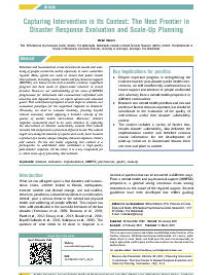Capturing Intervention in Its Context : The Next Frontier in Disaster Response Evaluation and Scale-Up Planning
Disasters and humanitarian crises threaten the health and wellbeing of people across the world, especially in more vulnerable regions. Many efforts are made to ensure that public health interventions, including mental health and psychosocial support (MHPSS), are based on the best available evidence.
Important progress has been made in effectiveness research in recent decades. However, our understanding of the value of MHPSS programmes for individuals and communities confronted with adversity still depends heavily on expert opinion and educated guess. This contribution proposes several steps to enhance our evaluation paradigm for the organised response to disasters. Obviously, we need to evaluate routinely, focusing beyond clinical outcomes, whilst applying a broader concept of the quality of mental health intervention. Moreover, disaster response evaluations need to be more attentive to capturing the intervention or disaster vulnerability context.
This context includes risk and protective factors at different levels. The context might vary along the timeline of a particular event, but it remains a product of a locally unique interplay between exposure, history and culture. On the one hand, capturing this context is a prerequisite to understand what constitutes a high-quality post-disaster response. On the other, it is a key component for a viable scale-up of promising interventions.
In: Intervention ; ISSN: 1571-8883 | 19 | 1 | maart | 4-14
https://www.interventionjournal.org/article.asp


